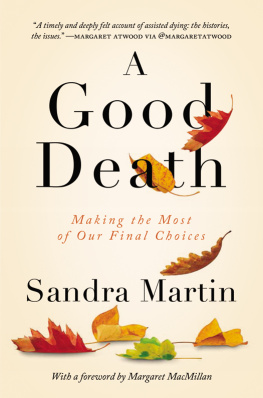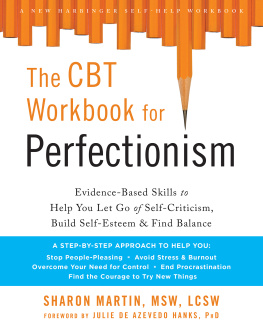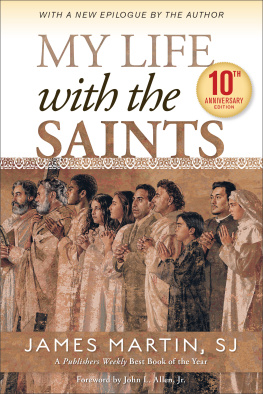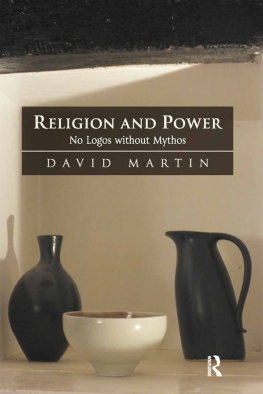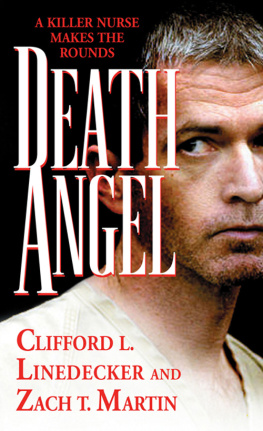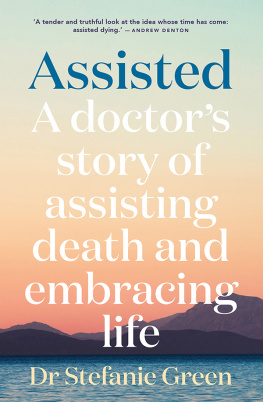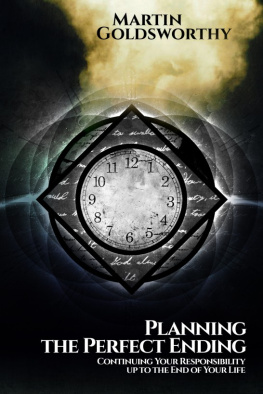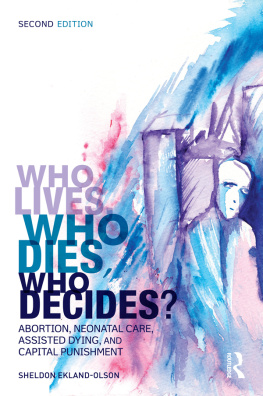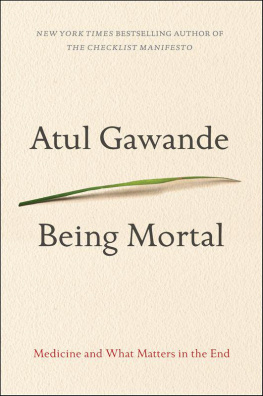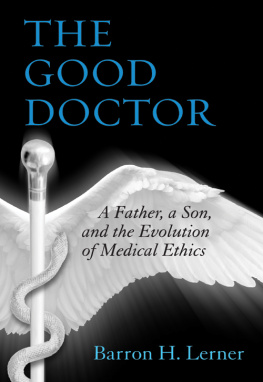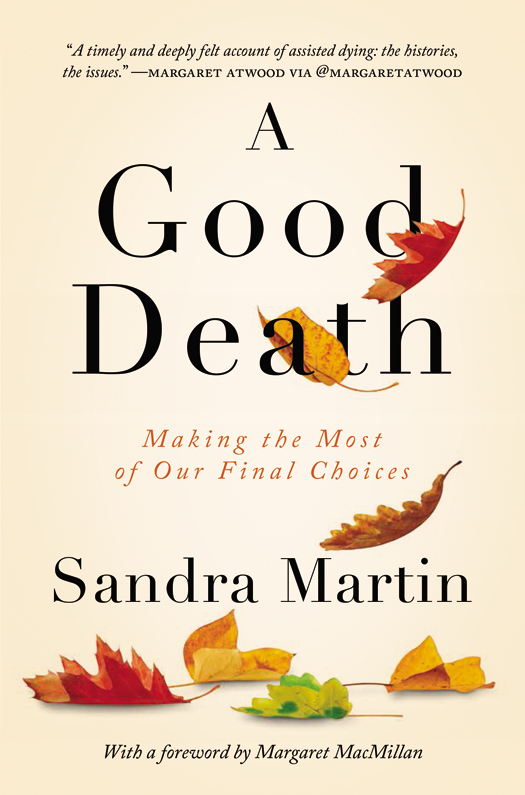S andra Martin is quite right. We dont do dying and death well in our present age. We will share intimate details about our lives with complete strangers on the Internet, but we shrink from confronting our own mortality or that of others. We hope, against all evidence, that we ourselves will not get old and die. The quest for the fountain of youth, after all, runs through Western civilization. One sip of its waters, so legend had it, would bring eternal life. The Spanish explorer Juan Ponce de Len thought he would find it in Florida. Today, we put our faith in exercise classes, cosmetic surgery, or special diets. Advances in genetic modification (so we are told) open the possibility for extending the human life span, perhaps for centuries. Already, some optimistsrich oneshave arranged for themselves to be frozen at the time of death until the cure for whatever has ended their lives can be found.
We prefer to ignore the inconvenient and inevitable arrival of deaththat of others and of our ownas much as we can. We dont even like the word, talking instead about passing as though it were a temporary, reversible process. We find those who are recently bereaved awkward to be around. Should we say something about those they are mourning? Might that seem tactless, upsettingheartless, even? So we send a card, mutter a few brief words, and then, with relief, turn to another subject.
Other generations and other cultures have dealt with death more robustly. For the Victorians, it was something to be expected. Mourning was not perfunctory, but prolonged, and it came with its own rules: Funerals were as elaborate as the families could afford. The living who had been left behind wore black for a stated period to signify their loss. Their stationery featured a black border. Women had mourning brooches or rings into which the hair of the loved one was often woven, while men wore black arm bands. Queen Victoria carried that to extremes and wore mourning clothes for the rest of her life to grieve her beloved Albert. Writersthink of Charles Dickenswrote movingly about death and mourning. Artists painted death scenes or sculpted effigies.
As a consequence of our own squeamishness, we do not have the sorts of conversations the Victorians had about the moral and practical implications of death. How should we arrange our affairs so that we dont leave a muddle for our heirs? What is a good death? How can we make the last months, days, and moments tolerable for those who are dying? How can we help to comfort those left behind? Martin is starting a conversation that is long overdue.
In the West, the demographic makeup of our populations is increasingly weighted towards the elderly. By 2024, more than 20 per cent of Canadians will be seniors, imposing an increasing burden on the state andas families grow smalleron the young. Perhaps technology will take up some of the slack, but the news that Japan is experimenting with robots programmed to be unfailingly chirpy and kind is not necessarily comforting. The fact that we are living longer also causes another set of problems. Medical care can now prolong life, but often at a cost to society (by making the last years so expensive) and the elderly themselves (by burdening them as their illnesses accumulate). We need to think about what happens in those last years before we die when, as in so many cases, we might be physically and mentally incapable. One encouraging development is that palliative care (the easing as much as possible of the last moments of life) is now both a respected part of the medical profession and more widespread. Its availability remains patchy, however, and dependent on local decisions rather than national policy.
We have both individual and collective choices to make, and we should be grateful to Martin for a clear and thoughtful guide to the recent history of dying and death in the West, and to the changing attitudes and debates on how to deal with that part of life. The issues she raises range from policy to those of moral dilemma. At present, many countries (including Canada) have far too many of the old or chronically sick in expensive hospital wardsbed-blockers, in the unkind phrasewhen they could be in protected living. Yet there is not enough room in homes with adequate medical and other support, and not enough help for those who are caring for family members at home. The case that Martin makes for government, and indeed society as a whole, to rethink how it allocates and uses resources seems irrefutable. And we as individuals need to confront our own difficult decisions while we still can: where to live, how to stay as independent as possible, and how to keep the burden placed on our nearest and dearest, who may be getting old themselves, from becoming intolerable.
Martin, known for the perceptive and thoughtful obituaries she has long been writing for the Globe and Mail, started this book to find out what she herself thought about dying, and to address the difficult issue of whether one should have the right to die at a time of ones own choosing. Her journey has taken her from court rooms to bedsides to assisted death clinics in Switzerland. It is both chastening and heartening to see the courage, determination, and sheer practicality with which so many of the people whose deaths Martin describes have faced the end. This cannot have been an easy book to write, but we should be grateful to her for taking it on. As she would say herself, we have got to stop avoiding what we find distressing. Let us hope that this advice is heard by individuals embarking on their own journeys towards the end and equally by those who make the policies they must follow. Martin reminds us that we all need to manage dying and death better than we are doing now.
Margaret MacMillan
St. Anthonys College, Oxford
February 2016
A decade ago I made a visit to a family friend I will call Eleanor. Frailty and a complex series of physical maladies had forced her to give up the house she had built in rural Prince Edward Island, after retiring from an executive position in the airline industry. She had stayed at home with 24/7 care as long as she could afford it and the system could supply her with nurses and personal care workers. Then she had moved into a nursing home in Charlottetown. Eleanor sat in her wheelchair, her hands resting in her lap, sculpted fingernails painted a familiar soft rose colour.
Much was the same as on my last visit, when she was still living in her comfortable bungalow with its stunning view over PEIs hills and dales, but much was different. Her conversation was stimulating, her mind sharp, her grooming elegant, but Eleanor was clearly bored and finding the days long and frustrating. Another resident, who was suffering from dementia, kept wandering into her room and interrupting our conversation. Eleanor was embarrassed and frustrated, but far too polite to speak sharply to the other resident or to summon a nurse. We sat in silence as we waited for the intruder to leave, only to have her reappear a few minutes later. Is this the future, I wondered, warehoused in an institution waiting for my body to conclude its sorry decline?
I had a plane to catch, so I made my goodbyes. Is there anything I can get you before I leave? I asked. Something quick and painless, she responded quietly, with an enigmatic smile. I was so shocked that I didnt answer, but I have never forgotten that naked glimpse into the ravages of infirmity in a woman I had always admired for her independence. It was another two years before she died, mourned by family and friends.

